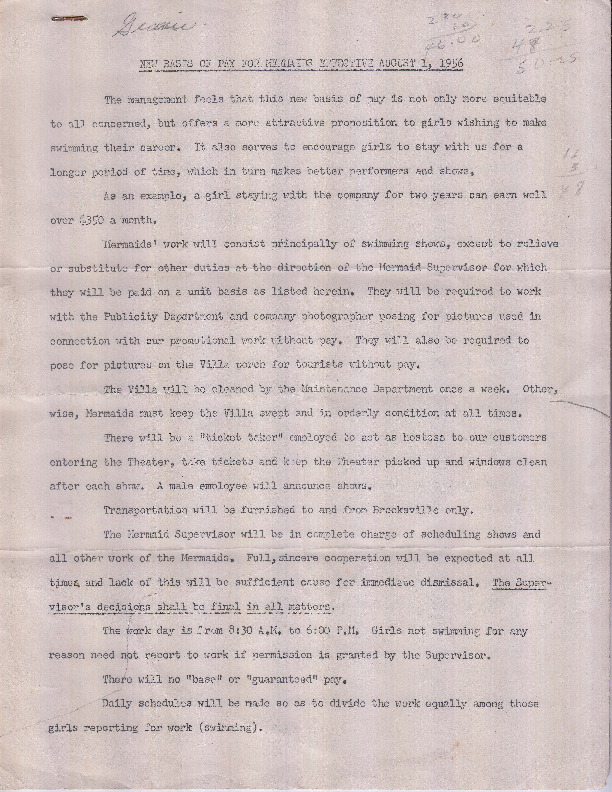New Basis of Pay for Mermaids Effective August 1, 1956
Dublin Core
Title
New Basis of Pay for Mermaids Effective August 1, 1956
Alternative Title
3-Page Typed Document Going Over the New Pay Rates of Weeki Wachee Springs Mermaids
Subject
Weeki Wachee Springs (Fla.)
Tourism--Florida
tourism & museum
Tourism--1960-1980
Ballet--1970-1980
Mermaids--Florida--Weeki Wachee--History
Theater--20th century
Description
A three-page document given to mermaid Geanie Brooks detailing updated pay rates for Weeki Wachee Mermaids, effective August 1, 1956. The document expresses that the pay increase was made in order to attract better performers and better retain current staff. Mermaids were still going to be paid per show, and still required to take promotional photos and photos with visitors for no additional pay. Under the new rules, mermaids were going to be paid $2.30 per unit. The pay per unit would increase ten cents every month a mermaid performs until it reached the maximum rate of $4.70. Performing a show equaled one unit, and performing extra duties qualified mermaids for exta partial units. There were other ways to make money at Weeki Wachee, including training new mermaids. When a trainee performed their first show, the trainer would recieve $100. If the trainee didn't qualify, the trainer received $25. Trainees were paid $75 a month, plus room and board. After passing training, they would become extras in shows. In this position, they would make $170 a month. When a position of mermaid opened up, the extra who had been an extra the longest would move up. Mermaids received double pay for working on holidays.
Along with a group of investors, Newton Perry opened Weeki Wachee Springs to the public in October of 1947. At the time, roadside attractions were becoming popular stops along Florida roadways. The attraction consisted of an amalgamation of vendors, an orchid garden, a river boat tour, as well as the star attraction: a mermaid show that took place in an underwater theater. Eventually, the May Museum of the Tropics, an "abandoned Seminole village", a show called “Birds of Prey”, and a petting zoo were added. After peaking in the 1950s and 1960s, attendance began to decline as theme parks and highways changed the dynamics of Florida's tourism. The State of Florida took over the attraction as a state park in 2008. Since then, the park has focused on appealing to a modern audience while preserving its history.
Along with a group of investors, Newton Perry opened Weeki Wachee Springs to the public in October of 1947. At the time, roadside attractions were becoming popular stops along Florida roadways. The attraction consisted of an amalgamation of vendors, an orchid garden, a river boat tour, as well as the star attraction: a mermaid show that took place in an underwater theater. Eventually, the May Museum of the Tropics, an "abandoned Seminole village", a show called “Birds of Prey”, and a petting zoo were added. After peaking in the 1950s and 1960s, attendance began to decline as theme parks and highways changed the dynamics of Florida's tourism. The State of Florida took over the attraction as a state park in 2008. Since then, the park has focused on appealing to a modern audience while preserving its history.
Abstract
3-Page typed document
Creator
Weeki Wachee Spring State Park
Source
Original two-page document "New Basis of Pay for Mermaids Effective August 1, 1956," 1956: Private collection of Shirley Herdge.
Publisher
Date Created
1956-08-01
Date Copyrighted
1956-08-01
Is Format Of
Digital Reproduction of three-page document: Shirley Herdge, 1956. Scanned by RICHES Team. RICHES, Orlando, Florida.
Is Part Of
Weeki Wachee Collection, RICHES.
Format
image/pdf
Extent
6.74 MB
Medium
8.5 x 11, Three-page typed document
Language
eng
Type
Still Image
Coverage
Weeki Wachee Springs State Park, Spring Hill, Florida
Accrual Method
Donation
Mediator
History Teacher
Humanitites Teacher
Visual Arts Teacher
Theater Teacher
Provenance
Originally created by Weeki Wachee Springs, owned by Shirley Herdfe, and published by RICHES.
Rights Holder
Copyright to this resource is held by Shirley Herdge and is provided here by RICHES for educational purposes only.
Contributing Project
Florida Humanities Council Community Grant Program and Friends of Weeki Wachee Springs State Park
Curator
Schwandt, Rebecca
Digital Collection
Source Repository
Private Collection of Shirley Herdge
External Reference
Allman, T.D. Finding Florida: The True History of the Sunshine State. New York: Atlantic Monthly Press, 2013.
Ammidown, Margot. “Edens, Underworlds, and Shrines: Florida’s Small Tourist Attractions.” The Journal of Decorative and Propaganda Arts 23, (1998): 238-259.
Georgiadis, Bonnie and Lu Vickers. Weeki Wachee Mermaids. Gainesville: University Press of Florida, 2012.
Hollis, Tim. Glass Bottom Boats and Mermaid Tails: Florida’s Tourist Springs. Mechanicsburg: Stackpole Books, 2006.
Pelland, Dan and Maryan Pelland. Images of America: Weeki Wachee. Mount Pleasant: Arcadia Publishing, 2006.
Revels, Tracy J. Sunshine Paradise: A History of Florida Tourism. Gainesville: University Press of Florida, 2011.
Vickers, Lu. Weeki Wachee City of Mermaids: A History of One of Florida’s Oldest Roadside Attractions. Gainesville: University Press of Florida, 2007.
Collection
Citation
Weeki Wachee Spring State Park, “New Basis of Pay for Mermaids Effective August 1, 1956,” RICHES, accessed February 26, 2026, https://richesmi.cah.ucf.edu/omeka/items/show/11144.
